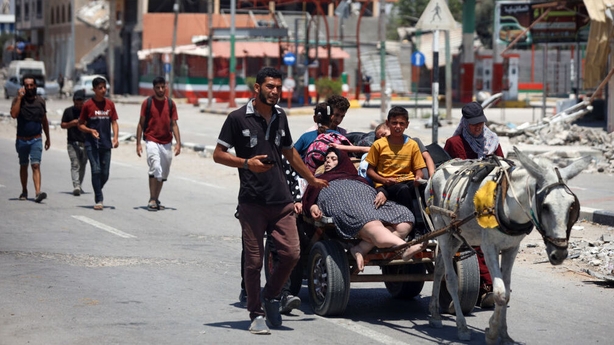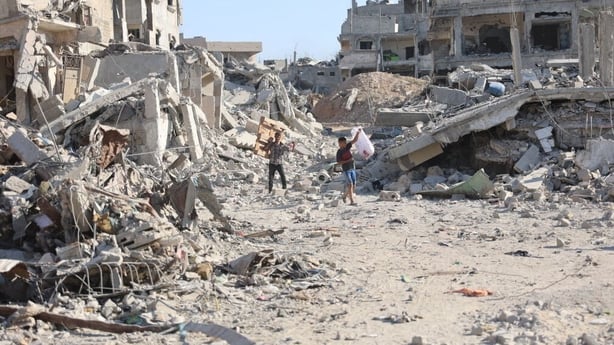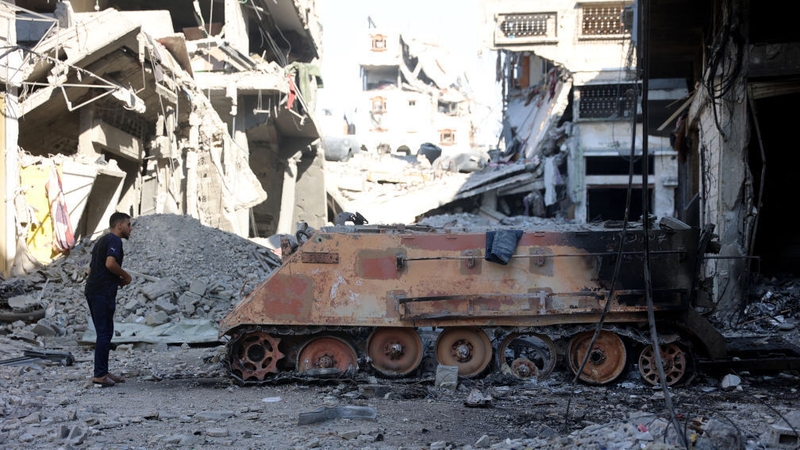Residents of Gaza City were trapped in houses and bodies lay uncollected in the streets under an intense new Israeli assault, as Washington pushed for a peace deal at talks in Egypt and Qatar.
A heavy Israeli assault on Gaza City this week could wreck efforts to finally end the war just as negotiations have entered the home stretch, Hamas said.
In a statement, the Palestinian Islamist militant group said mediators had yet to provide it with updates on the state of the talks since it made concessions last week in response to a US-backed Israeli peace offer.
US envoy Brett McGurk was in Israel, where he met Defence Minister Yoav Gallant.
Home to more than a quarter of Gaza's residents before the war, Gaza City was destroyed during the first weeks of fighting last year, but hundreds of thousands of Palestinians have returned to homes in the ruins.
They have once again been ordered out by the Israeli military.
The Gaza health ministry said it had reports of people trapped and others killed inside their houses in the Tel Al Hawa and Sabra districts of the cty, and rescuers could not reach them.
The Civil Emergency Service said it estimated that at least 30 people had died in the Tel Al-Hawa and Rimal areas and it could not recover bodies from the streets.

Despite army instructions to residents of Gaza City that they can use two "safe routes" to head south, many refused to heed the order. Some posted on social media: "We are not leaving".
"We will die but not leave to the south. We have tolerated starvation and bombs for nine months and we are ready to die as martyrs here," said 30-year-old Mohammad Ali.
Mr Ali, whose family has relocated several times within the city, said they had been running short of food, water and medicine.
"The occupation bombs Gaza City as if the war was restarting. We hope there will be a ceasefire soon, but if not then is God's will."
'No place is safe'
The United Nations Relief and Works Agency for Palestine Refugees (UNRWA) said that "Israeli authorities issue these orders and people have, in a matter of minutes or hours, just to leave to wherever they can".
"No place is safe in Gaza and no one is safe," according to UNRWA Director of Communications Juliette Touma.
"No one has been spared, not even aid workers or doctors or journalists," she told RTÉ's Morning Ireland.
Ms Touma said that around 200 UNRWA staff have been killed since the war began.
"This has got to stop. We need a ceasefire. It's long overdue. Has to happen as soon as possible. It's been nine very, very long and brutal months," she added.
We need your consent to load this rte-player contentWe use rte-player to manage extra content that can set cookies on your device and collect data about your activity. Please review their details and accept them to load the content.Manage Preferences
Ms Touma said that, over four days, four schools were hit.
"All of them have been used as shelters for displaced families.
"As a result, many people sheltering in those schools, more than 500 in fact, have been killed.
"These are people who have come to seek protection under the United Nations flag," she said.
Ms Touma called "on all parties to the conflict to refrain from attacks on United Nations facilities and other facilities like schools, like hospitals, like other basic infrastructure that provide shelter for civilians".
In the Shejaia suburb of Gaza City, residents are returning on foot to a desolate landscape of destroyed buildings after Israeli forces withdrew following a two-week offensive.
The territory's main cemetery had been bulldozed by the army. People wheeled supplies on the back of bicycles across rubble-strewn tracks, passing the remains of burned out and blasted Israeli armoured vehicles.
"We have returned to Shejaia after 15 days. You can see the destruction. They spared nothing, even trees, there was a lot of greenery in this area. What is the guilt of stones and trees? What is my guilt as a civilian?" resident Hatem Tayeh said.
"There are bodies of civilian people. What is the guilt of the civilian? Who are you fighting?"

Israel launched its assault on Gaza last year after Hamas-led militants stormed across the border fence into southern Israel, killing 1,200 people and capturing more than 250 hostages, according to Israeli tallies.
Since then, more than 38,000 have died in the Israeli response, medical authorities in Gaza said.
The Hamas-run Gaza government media office said Israeli forces had quit the Shejaia suburb of Gaza City after more than two weeks of a new military invasion, in which dozens of people were killed and residential districts were destroyed.
At the southern edge of the enclave in Rafah, near the border with Egypt, where tanks have been operating since May, residents said the army continued to blow up houses in western and central areas of the city, amid fighting with Hamas, Islamic Jihad, and other smaller factions.
Palestinian health officials said four people were killed, including a child, in an Israeli air strike in Tel Al-Sultan in western Rafah.
The Israeli military said that around five rockets fired from the Rafah area were successfully intercepted.
The negotiations in Qatar and Egypt follow important concessions last week from Hamas, which agreed that a truce could begin and some hostages released without Israel first agreeing to end the war.
Mr Netanyahu, who faces opposition within his right-wing cabinet to any deal that would halt the war without Hamas vanquished, says a deal must allow Israel to resume fighting until it meets all its objectives.
Israel's defence ministry said Mr Gallant and visiting US envoy Mr McGurk discussed "the progress achieved in discussions regarding an agreement for the release of hostages, with an emphasis on the security measures required to prevent weapons smuggling into Gaza".
